目录
1、读者和读者互不影响
2、写者和写者互斥
3、读者和写者互斥
(1) 读者持有锁
(2) 写者持有锁
1、读者和读者互不影响
假设现在只有读者线程,我们让一个读者线程申请锁以后,但是不释放读写锁。
#include <stdio.h>
#include <unistd.h>
#include <pthread.h>
pthread_rwlock_t rwlock;
void* read_thread(void* args){
pthread_detach(pthread_self());
int num = *(int*)args;
while (1)
{
pthread_rwlock_rdlock(&rwlock); // 申请读者锁
printf("读者[%d]正在读内容\n", num);
sleep(1);
//pthread_rwlock_unlock(&rwlock);
}
}
int main(){
pthread_t tid1,tid2,tid3,tid4;
pthread_rwlock_init(&rwlock, NULL);
int i = 1, j = 2;
pthread_create(&tid1,NULL,read_thread, (void*)&i);
pthread_create(&tid2,NULL,read_thread,(void*)&j);
while(1){
sleep(1);
}
return 0;
}
我们发现,读者和读者之间不会去争抢锁,即便是某一个读者线程申请到锁,也不会影响其他读者线程来申请锁。

2、写者和写者互斥
我们采用和上面类似的做法,只有两个写者线程,其中一个写者线程获取到锁以后,不释放锁,看一下另一个写者线程能否得到锁。
#include <stdio.h>
#include <unistd.h>
#include <pthread.h>
pthread_rwlock_t rwlock;
void* write_thread(void* args){
pthread_detach(pthread_self());
int num = *(int*)args;
while (1)
{
pthread_rwlock_wrlock(&rwlock);
printf("写者[%d]正在写内容\n", num);
//pthread_rwlock_unlock(&rwlock);
sleep(1);
}
}
int main(){
pthread_t tid1,tid2,tid3,tid4;
pthread_rwlock_init(&rwlock, NULL);
int i = 1, j = 2;
pthread_create(&tid3,NULL,write_thread,(void*)&i);
pthread_create(&tid4,NULL,write_thread,(void*)&j);
while(1){
sleep(1);
}
return 0;
}
我们发现始终只有写者2在打印,说明写者2拿到锁以后,写者1就无法获取到锁了。说明写者和写者之间是互斥的。

3、读者和写者互斥
这里就分为两种场景:读者持有锁、写者持有锁。
- 读者持有锁时,写者申请锁会阻塞等待,但是读者申请锁不受影响。
- 写者持有锁时,无论是读锁申请还是写锁申请,都会被阻塞
(1) 读者持有锁
现在有三个线程,两个读线程,一个写线程,他们执行的操作如下:
- 读者[1]:立马申请锁,但是不释放
- 写者[1]:延迟1s以后申请(验证写者申请锁是否会被阻塞)
- 读者[2]:延迟2s后申请(验证写者之后的读锁申请是否会被阻塞)
#include <stdio.h>
#include <unistd.h>
#include <pthread.h>
pthread_rwlock_t rwlock;
void* read_thread1(void* args){
pthread_detach(pthread_self());
printf("读者[1]申请锁\n");
while (1)
{
pthread_rwlock_rdlock(&rwlock);
printf("读者[1]正在读内容\n");
sleep(1);
// pthread_rwlock_unlock(&rwlock); // 读者1不释放锁
}
}
void* read_thread2(void* args){
pthread_detach(pthread_self());
//int num = *(int*)args;
sleep(2); // 让读者[2]延迟2s再申请
printf("读者[2]申请锁\n");
while (1)
{
pthread_rwlock_rdlock(&rwlock);
printf("读者[2]正在读内容\n");
pthread_rwlock_unlock(&rwlock);
sleep(1);
}
}
void* write_thread(void* args){
pthread_detach(pthread_self());
sleep(1); // 让写者[1]延迟1s再申请
printf("写者1申请锁\n");
while (1)
{
pthread_rwlock_wrlock(&rwlock);
printf("写者[1]正在写内容\n");
pthread_rwlock_unlock(&rwlock);
sleep(1);
}
}
int main(){
pthread_t tid1,tid2,tid3,tid4;
pthread_rwlock_init(&rwlock, NULL);
int i = 1, j = 2;
pthread_create(&tid1,NULL,read_thread1, NULL);
pthread_create(&tid2,NULL,read_thread2, NULL);
pthread_create(&tid3,NULL,write_thread, NULL);
while(1){
sleep(1);
}
return 0;
}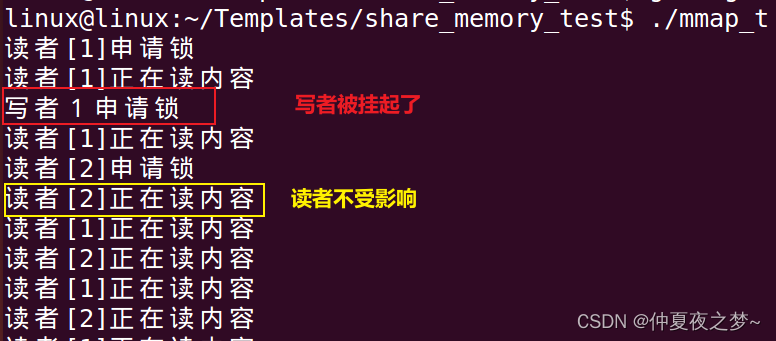
(2) 写者持有锁
我们采用和上面类似的步骤,
- 写者[1]:先申请锁,但不释放
- 其他读者:延迟1s后申请
#include <stdio.h>
#include <unistd.h>
#include <pthread.h>
pthread_rwlock_t rwlock;
void* read_thread1(void* args){
pthread_detach(pthread_self());
sleep(1); // 让读者[1]延迟1s再申请
printf("读者[1]申请锁\n");
while (1)
{
pthread_rwlock_rdlock(&rwlock);
printf("读者[1]正在读内容\n");
pthread_rwlock_unlock(&rwlock);
sleep(1);
}
}
void* read_thread2(void* args){
pthread_detach(pthread_self());
//int num = *(int*)args;
sleep(1); // 让读者[2]延迟1s再申请
printf("读者[2]申请锁\n");
while (1)
{
pthread_rwlock_rdlock(&rwlock);
printf("读者[2]正在读内容\n");
pthread_rwlock_unlock(&rwlock);
sleep(1);
}
}
void* write_thread(void* args){
pthread_detach(pthread_self());
printf("写者1申请锁\n");
while (1)
{
pthread_rwlock_wrlock(&rwlock);
printf("写者[1]正在读内容\n");
// pthread_rwlock_unlock(&rwlock); // 写者1不释放锁
sleep(1);
}
}
int main(){
pthread_t tid1,tid2,tid3,tid4;
pthread_rwlock_init(&rwlock, NULL);
int i = 1, j = 2;
pthread_create(&tid1,NULL,read_thread1, NULL);
pthread_create(&tid2,NULL,read_thread2, NULL);
pthread_create(&tid3,NULL,write_thread, NULL);
while(1){
sleep(1);
}
return 0;
}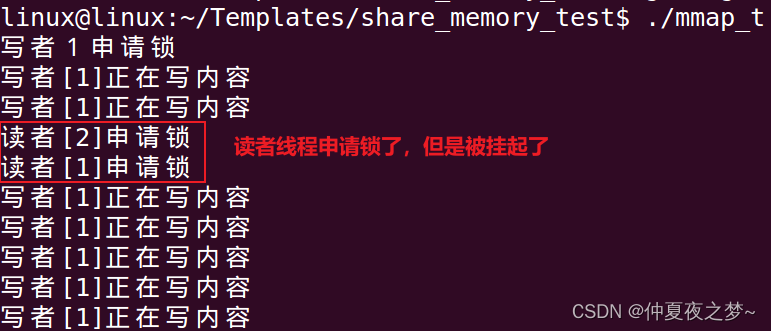
![[附源码]JAVA毕业设计计算机专业在线学习评估软件-演示录像-(系统+LW)](https://img-blog.csdnimg.cn/0eaef95c4778471c838db57183023c6e.png)
![[附源码]Python计算机毕业设计Django教学辅助系统](https://img-blog.csdnimg.cn/46be7d8dfc534c47bf29a762868b3b6d.png)

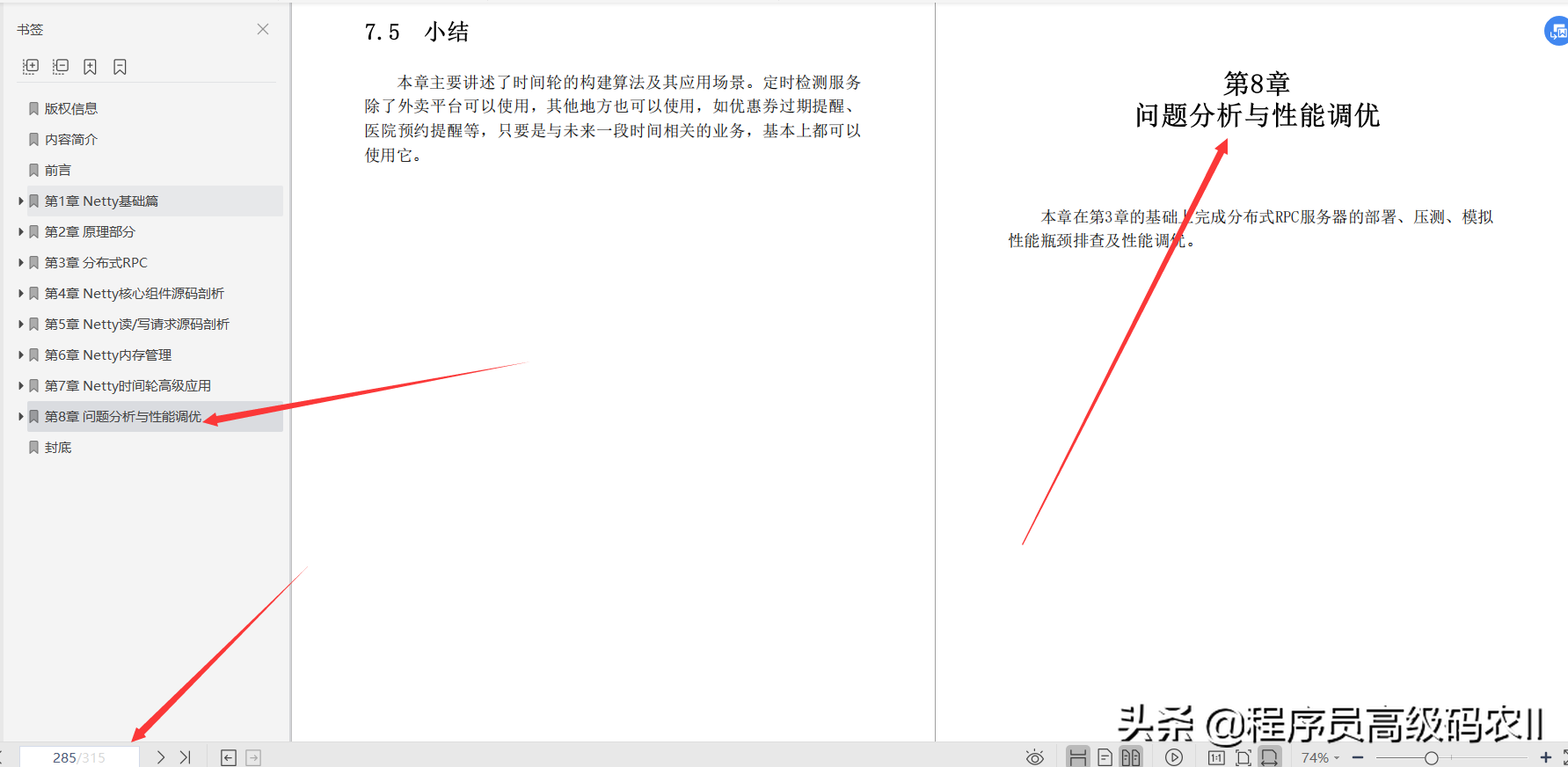
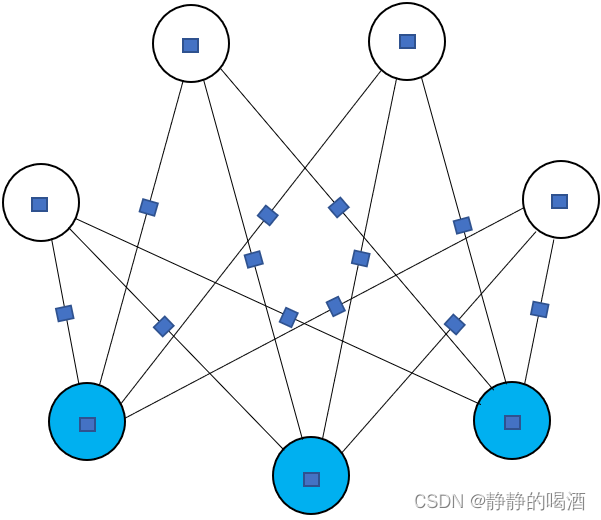
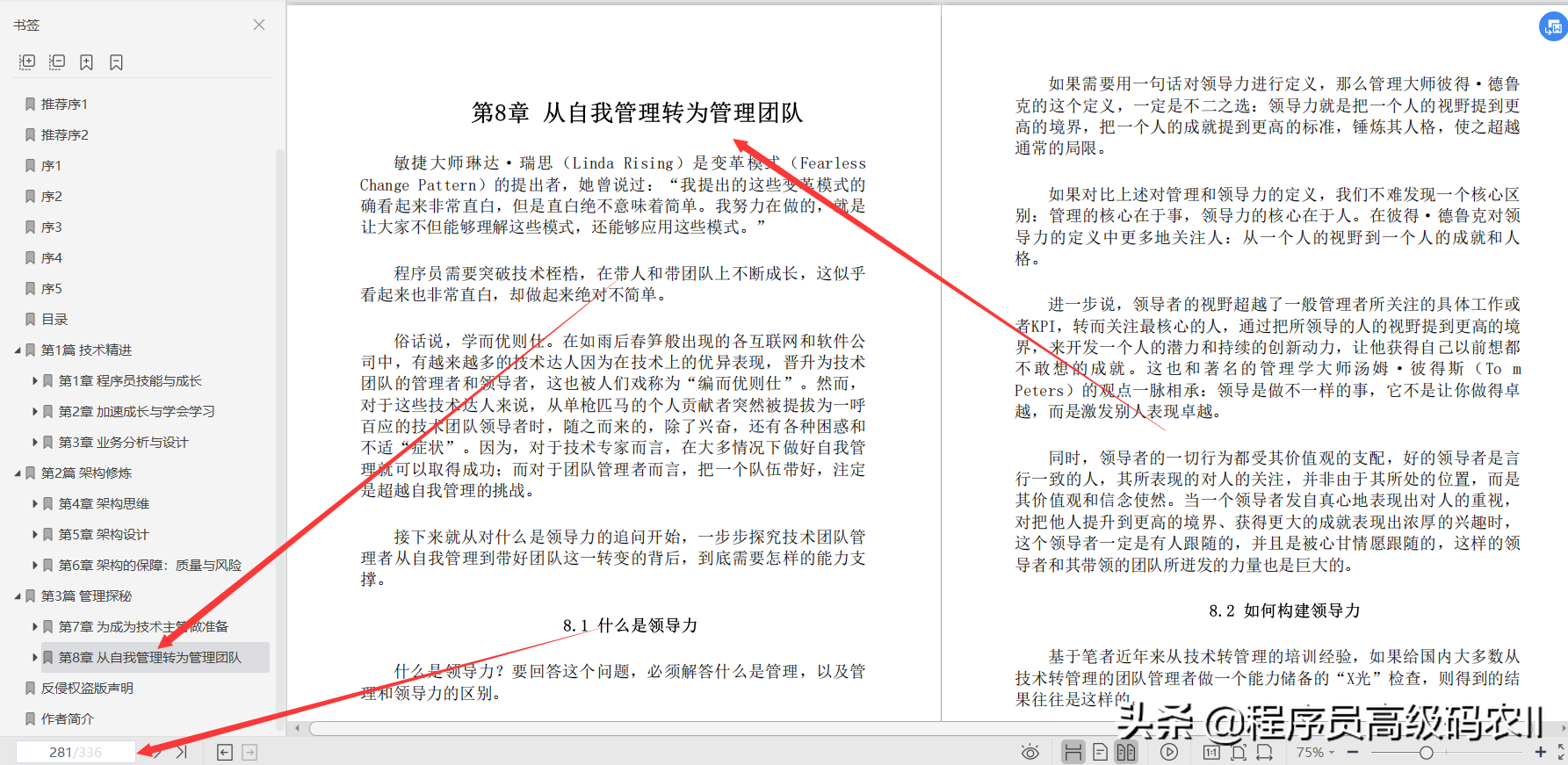

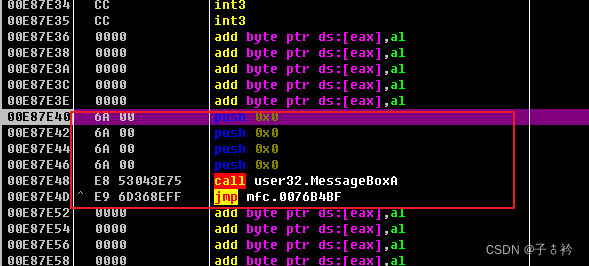
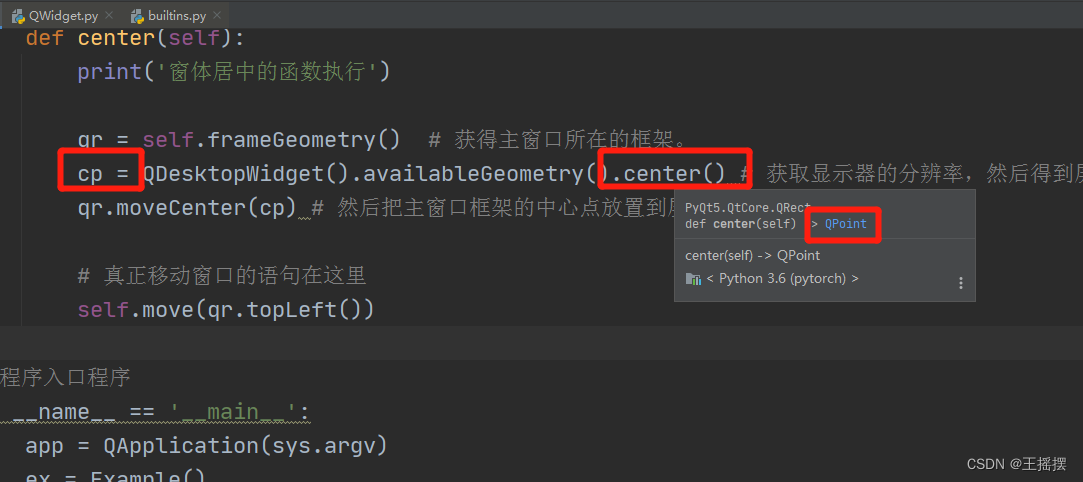


![[附源码]计算机毕业设计医疗纠纷处理系统Springboot程序](https://img-blog.csdnimg.cn/24749b72e5fd4561a57c07cb45d3e871.png)



![[附源码]计算机毕业设计springboot疫情网课管理系统](https://img-blog.csdnimg.cn/458e320ecaa74e25a4b16bdb628dfeb9.png)
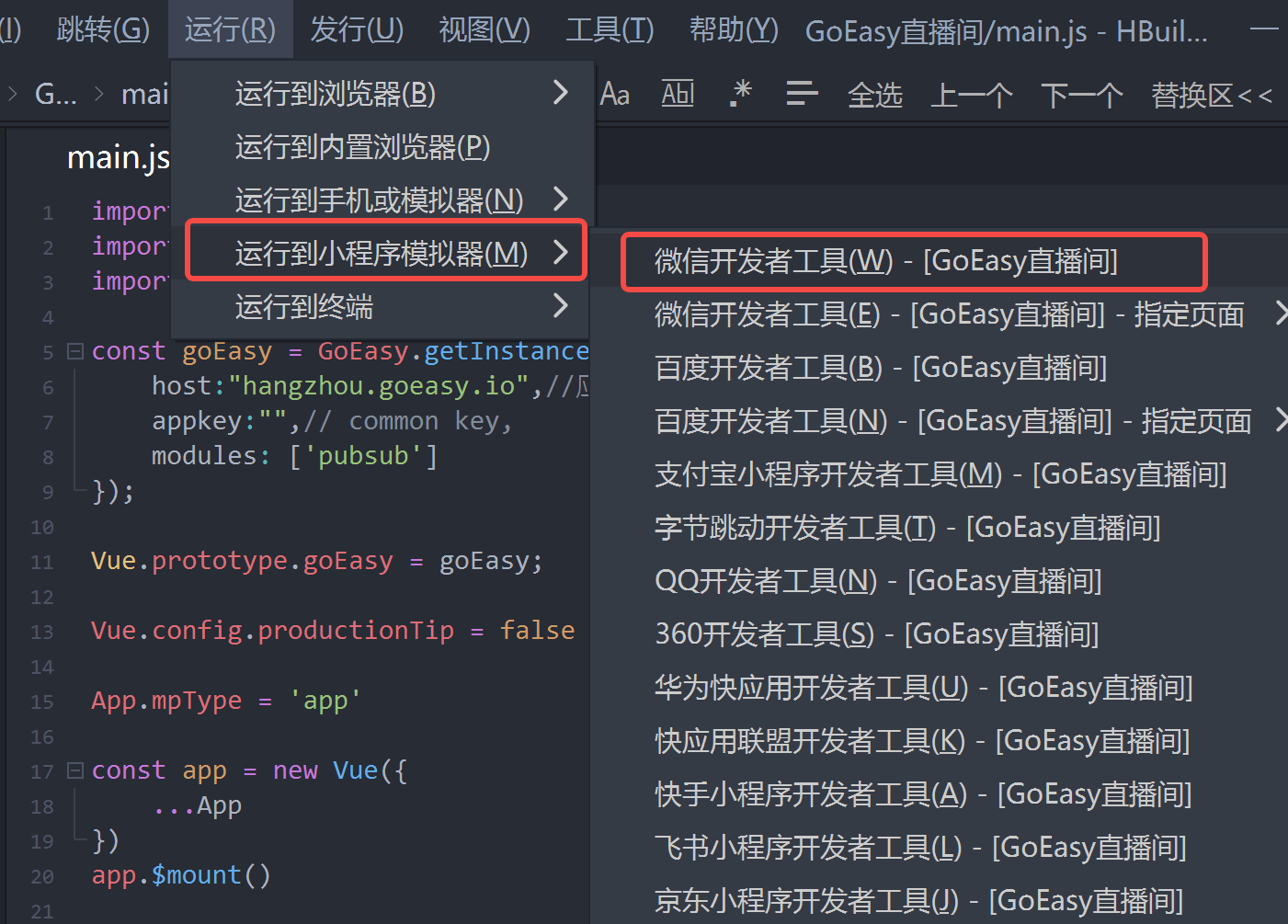
![[附源码]计算机毕业设计新能源汽车租赁Springboot程序](https://img-blog.csdnimg.cn/32c62320d659469a8e34d59a6735e6ab.png)
![[附源码]计算机毕业设计疫情物资管理系统Springboot程序](https://img-blog.csdnimg.cn/942d2056c9c84b64b64edd2df98b29e6.png)